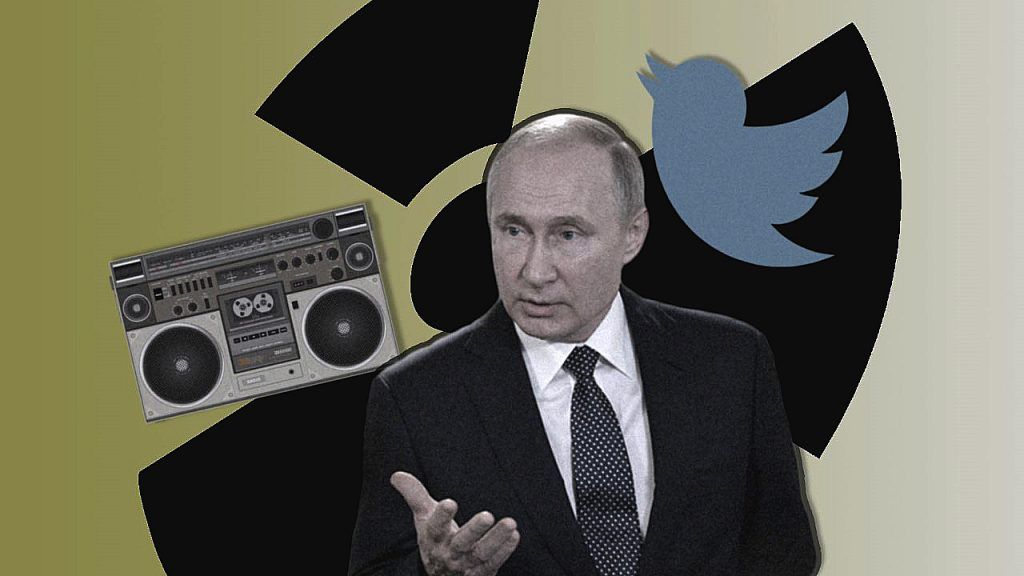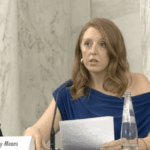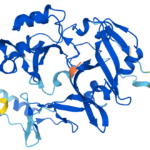Fake news of a Chinese nuclear explosion got Russian attention
By Matt Field | December 9, 2019
 A Russian government agency helped amplify a US radio host's fake news that the Chinese had detonated a nuclear device. Credit: Bulletin. (Putin image via www.kremlin.ru / Creative Commons)
A Russian government agency helped amplify a US radio host's fake news that the Chinese had detonated a nuclear device. Credit: Bulletin. (Putin image via www.kremlin.ru / Creative Commons)
After nighttime AM radio host, white supremacist, and former US federal convict Hal Turner posted the shocking “news” on his website last month that China may have exploded a nuclear weapon in the ocean, conspiracy theorists and supposed news sources alike pushed the story hard on Twitter. But it turns out they weren’t the only ones following this false report. The day that the tech news site Gizmodo debunked the radio host’s story, the Russian government’s consumer watchdog agency weighed in: It had information that there’d been a radiation incident in the South China Sea.
“According to information received from the Global Network for Environmental Monitoring in the South China Sea, an increase in the level of radiation background in connection with a radiation incident has been recorded,” a translated version of the Nov. 22 statement said.
Rospotrebnadzor, the Russian agency, seems to have relied on the same third-party, crowd-funded radiation monitoring network that Turner cited on his radio show— the uRADMonitor Global Environmental Monitoring Network. The statement does not mention the Comprehensive Nuclear Test Ban Treaty Organization, which runs a sophisticated worldwide monitoring system aimed at identifying nuclear explosions. Russia has access to that system.
Rospotrebnadzor did not respond to repeated requests for comment, but, the founder of uRADMonitor, Radu Motisan, said that “it is highly probable” the agency got its information from the uRADMonitor chart embedded on Turner’s website post. The network, started in 2013, has a website that shows radiation levels registered by devices around the world. But the data Turner relied on for his radio report came from devices that were marked as offline, and that showed old data, Motisan said. And even that old data did not actually show a significant spike in radiation.
“The authors of the fake news used it to start a false debate on an imaginary event. Why imaginary? Because any serious contamination resulting from a nuclear incident would make the readings go out of scale. Certainly not the case here, and the authors certainly knew that,” Motisan said.
Last days of #radiation data in #SouthChinaSea registered by @uRADMonitor network is NORMAL! @Gizmodo https://t.co/fm9VcFQ5WA pic.twitter.com/IbUHcPFDtE
— Radu Motisan (@RaduMotisan) November 22, 2019
As a signatory of the Comprehensive Nuclear Test Ban Treaty, Russia has direct access to the treaty organization’s International Monitoring System–a network of more than 300 monitoring stations and laboratories in place to detect nuclear explosions through seismological and other means. In seconds, monitoring stations around the world transmit data to Vienna, where scientists analyze the results and send information along to the treaty countries.
“Our network has not registered any event of interest in the region that is relevant to CTBTO’s mission to detect nuclear test explosions,” Gill Tudor, public information chief for the Comprehensive Nuclear Test Ban Treaty Organization, wrote in an email. “Equally, we have not received any request for information on radioactivity concentrations under international agreements in the event of a radiological or nuclear emergency.”
Turner did not respond to a request for comment. The Southern Poverty Law Center describes Turner as a former federal convict and white supremacist.
If Rospotrebnadzor failed to make the connection between its announcement and Turner’s conspiracy theory, it wasn’t lost on the Russia-based media that reported on the statement. Turner’s report was dismissed as “fake” by scientists in Gizmodo, The Moscow Times noted. Same with The Siberian Times.
But the Russian media network RT, long suspected of being a propaganda arm of the Russian government, came to Rospotrebnadzor’s defense; the agency probably felt it had to respond to the nuclear rumors. “Rospotrebnadzor’s message might not have been the most aptly-worded one, yet it basically said that they had heard the rumors and ramped up monitoring,” the outlet reported.
Of course, the Russian agency used the word “information” and not “rumors.” Perhaps more important, Rospotrebnadzor was likely citing uRADMonitor’s data in hinting there had been a “radiation incident.”
“As far as our data goes, there was no incident,” Motisan said. “Putting the terms ‘nuclear explosion’ next to the value of double the normal radiation level is a joke.”
Together, we make the world safer.
The Bulletin elevates expert voices above the noise. But as an independent nonprofit organization, our operations depend on the support of readers like you. Help us continue to deliver quality journalism that holds leaders accountable. Your support of our work at any level is important. In return, we promise our coverage will be understandable, influential, vigilant, solution-oriented, and fair-minded. Together we can make a difference.
Keywords: China, Comprehensive Nuclear Test Ban Treaty, Hal Turner, Rospotrebnadzor, Russia, South China Sea, uRADMonitor
Topics: Disruptive Technologies















